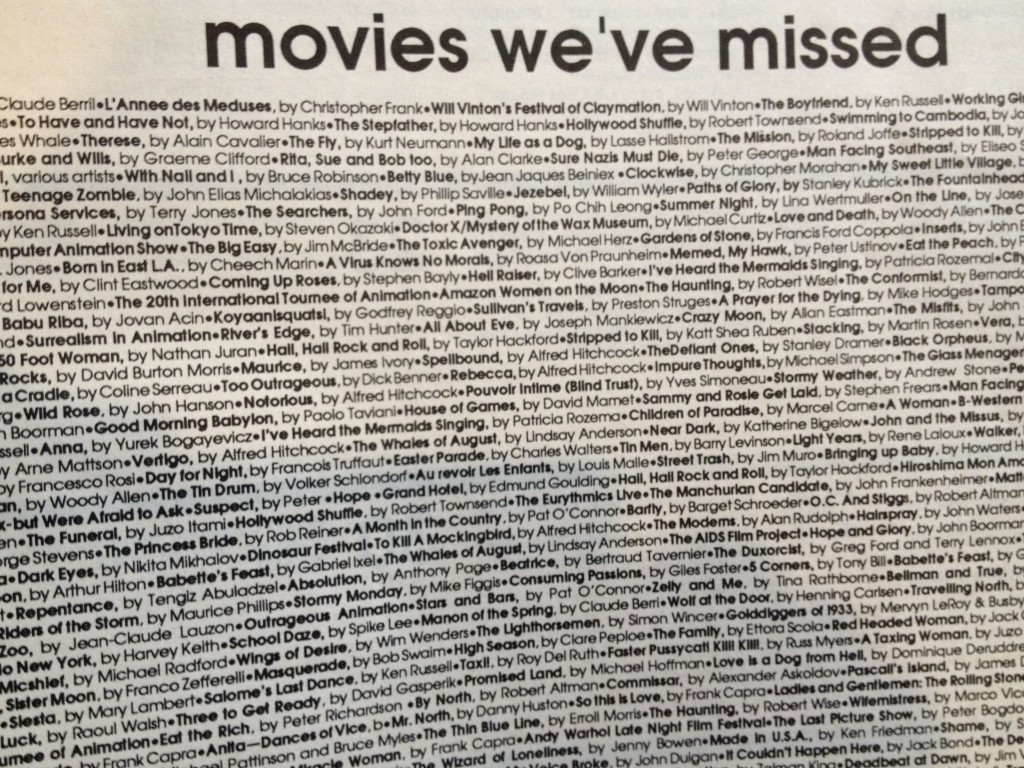Ace May 1989
Bring Back the Kentucky Theatre
by Jo Ann Circosta


The Kentucky has languished in suspended animation since October 1987, when a fire in the adjacent Fleur de Lys restaurant forced the closure of both establishments. The restaurant moved within a matter of months and is doing a thriving business on Upper Street.
The Kentucky Theatre, however, continues to sit quietly, waiting to be revived — “Closed Temporarily” being its limp lament.
Its revival has been delayed, not because of a lack of interest on the part of its loyal followers, but rather because of the complex legal aspects of its ownership and operation. A lawsuit filed in March in Fayette Circuit Court should help resolve the entanglements between land owners and building owners and allow the Kentucky to live once again.
The land is owned by Joe Graves and relatives, of Lexington, and two trusts which are administered by First Security National Bank and Trust Co. The building is owned by the family-run corporation, M. Switow and Sons Enterprises, Inc. of Louisville. The Switows are the original leaseholders of the land and builders of the 67-year-old building which houses the theatre.
Although the Switow company has done some renovation since the fire, the lawsuit contends that the company has failed to “keep and maintain the leased premises, and every part thereof, in a clean and wholesome condition.”
In a telephone interview, counsel for the landowners, Bruce Reynolds, would say only that attorneys for both sides have had discussions and, while the lawsuit is ongoing, there may be hope of an agreement to settle without court action. “We are unsure right now where we stand,” Reynolds said. (Henry Saag, representatives of the Switows’ Associated Theatres of Kentucky, could not be reached for comment.)
One thing Reynolds is sure of: both groups want to see The Kentucky operating again. “Both parties recognize its role in downtown Lexington’s past and future,” said Reynolds.
There seem to be a great many others who also realize its importance. Even though it has lain dormant almost 18 months now, the Kentucky has continued to generate interest from concerned patrons as well as business people.
One such person is local businessman Howard Stovall. According to Stovall, he spent “15 months of time, effort, sweat, and several thousand dollars,” to put together an association to operate the Kentucky Theatre. But negotiations always seemed to stall, and Stovall says he never really understood why. He finally gave up his efforts last month when he became aware of the lawsuit.
Stovall has made all parties aware that he would still be willing to go ahead with his plan, but the next move is theirs.
However, business prospects change the longer the building sits vacant, and he would “need to renegotiate the entire project” if he were to become involved again.
Jim Croley, a Lexington developer who, until recently, was also negotiating with both groups for use of the theatre and its adjacent properties, found “a multitude of interest” in the Kentucky very encouraging. Although he had to withdraw from negotiations to pursue other interests, Croley still considers the theatre and the entire building a unique development opportunity. As a man who looks for projects that, as he says, “involve more than bricks and mortar,” Croley feels the Kentucky is “one of the few grand arts theatres around…there is very much a place for it in Lexington.”
Councilwoman Pam Miller, a member of the citizens’ group, “Friends of the Kentucky,” has been involved in an effort to reopen the theatre. The group was prepared to lease the theatre and progressed as far as negotiating with the Switow company. Differences between land and building owners, however, kept the group from going any further, and it has had no real involvement since.
Miller remains a firm believer in The Kentucky’s value to Lexington as an historical, as well as cultural asset. She sees it as “virtually the only institution that has survived the urban renewal process.” She, like its many other loyal fans, eagerly await its rebirth.


Fred Mills, the Kentucky’s manager since 1974, is one person who is not about to sing dirges for the grand old theatre. He is ready to resume his duties at a moment’s notice, and is being retained by the Switow company to do just that. Mills, who started working at The Kentucky as an usher when he was 17, is viewed by owners as an integral part of the atmosphere that makes The Kentucky special. His personal involvement with, and concern for customers, is one of the reasons for their loyalty.
Mills believes the theatre’s popularity is due to three basic factors: the quality of the facility (a large screen and excellent sound system), the very reasonable cost of entertainment ($2.25), and the diversity of films shown. He feels that Lexington is extremely fortunate to have a theatre that was once considered “one of the top-ten theatres in the country.”
In fact, in its early days — the 20s and 30s — the Kentucky Theatre, along with The Strand, The Ben Ali, and the Opera House, formed a cluster of grand movie houses in the downtown area. According to Mills, it earned its top-ten rating in the mid-1930s under the direction of the Schine Company, which had leased it from the Switows. During that time, The Kentucky won awards for its management and promotions.
After the Schine Company gave up the operation in 1958, the Switows were involved in and out over the next 20 years. In 1978, they resumed management and decided on the revival format which has made the theatre so popular.


“The Kentucky has been an irreplaceable loss,” bemoaned one film fan. “There are no alternative cinemas in the area offering that variety of great independent and foreign films. That’s what made The Kentucky so unique.”
Supporters believe, all through its long and varied history, The Kentucky has been a factor in forming the special ambiance of downtown Lexington. What its contribution will be in the future remains to be seen.
YOU MIGHT ALSO LIKE
Fred Mills: A Model Institution running a Model Institution, Kentucky Theatre Ace December 2011
New Movie ‘Bloodworth’ Highlights Kentucky Talent Ace May 2011







